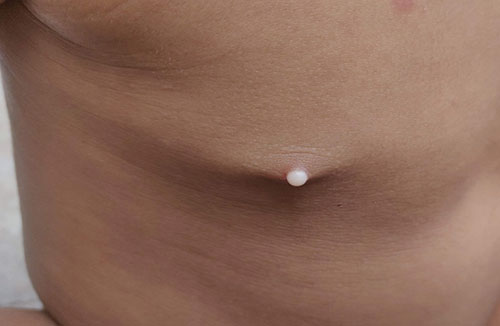|
|
|
Indian Pediatr 2021;58: 1104 |
 |
Congenital Milium of the Nipple
|
Shekhar Neema,1 Vivek Kumar Singh,2 Subhash
Chandra Shaw3*
Departments of 1Dermatology and 2Pediatric
Surgery, Armed Forces Medical College, Pune, Maharashtra;
3Department of Pediatrics, Army Hospital R & R, Delhi.
Email:
[email protected]
|
|
A 13-month-old girl, born of non-consanguineous marriage,
presented with complaints of pearl like lesion on right nipple
since birth. The lesion had slowly increased to size of a pea,
but was not associated with any pain or itching. Growth and
development were normal. Examination showed 5×5 mm pearly white
nodule involving right nipple, with normal surrounding skin (Fig.
1). There was no erythema, induration or tenderness around
the lesion. Left nipple was normal. A diagnosis of congenital
milium of nipple was made, and parents were counselled about the
benign and self-limiting nature of the lesion.
 |
|
Fig. 1 Pearly white nodule
involving right nipple, with normal surrounding skin.
|
Milia (singular, milium) are inclusion cysts
in the epidermis. The lesion develops due to entrapment of
keratin. It appears as yellow to pearly white papule on the
skin. It can be primary that arise spontaneously or secondary
resulting from trauma such as sunburns or bullous skin disorder.
Primary congenital milia are common in neonate and may be seen
in almost 40% of full-term neonate. They generally appear over
the cheeks, nose or eyelids. Solitary and large milium is seen
over areola, scrotum or vulva. Solitary milium should be
differentiated from the other lesions like syringoma, calcinosis
cutis, trichoepithelioma and fibroma. Milium of the nipple
should also be differentiated from witch’s milk seen in some
neonates due to maternal hormones, and galactorrhea due to
excessive secretion of prolactin. Congenital milia resolve
spontaneously but rarely may persist for a long duration.
Excision of the lesion in the nipple area should be avoided as
it can lead to functional and aesthetic complications,
especially in a female child.
|
|
|
 |
|

